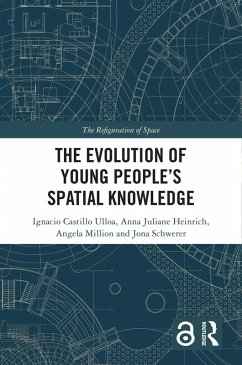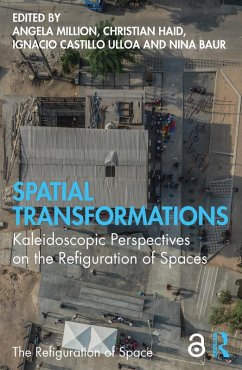
Knowledge Evolution and Societal Transformations (eBook, PDF)
Action Theory to Solve Adaptive Problems
Versandkostenfrei!
Sofort per Download lieferbar
55,95 €
inkl. MwSt.
Weitere Ausgaben:

PAYBACK Punkte
28 °P sammeln!
Knowledge is more than information but instead the organizing of information into theories and practices that allow us to do things and accomplish goals. The first stage of knowledge creation depended upon creative scientists and entrepreneurs, but the second stage required research laboratories and teams. Now cooperation between organizations is necessary to solve individual, organizational, institutional, and global problems that face us today.Individuals presently are raised in four kinds of social contexts: traditional, modern, post-modern, and anomic. These contexts explain partisan divid...
Knowledge is more than information but instead the organizing of information into theories and practices that allow us to do things and accomplish goals. The first stage of knowledge creation depended upon creative scientists and entrepreneurs, but the second stage required research laboratories and teams. Now cooperation between organizations is necessary to solve individual, organizational, institutional, and global problems that face us today.
Individuals presently are raised in four kinds of social contexts: traditional, modern, post-modern, and anomic. These contexts explain partisan divides as well as the inability of some to succeed in society. Post-modern contexts produce individuals who are cognitively complex, creative, critical but have empathy towards others. The acceleration in knowledge creation is caused by not only the growth of more post-modern individuals who are creative but organizational innovation and innovative regions. Organizational structures that discourage radical innovations are contrasted with those that facilitate it. Similarly, the histories of three innovative regions--Silicon Valley, Kistra in Sweden, and Hsinchu in Taiwan-are contrasted with the failure of Rt. 128 near Boston.
During the second wave of knowledge creation, social structures were differentiated vertically. Now in the third wave, the differentiation process is horizontal. In the stratification system this means different capitalist classes and work logics rather than social classes with super salaries, thus increasing social inequality. In the study of organizations, this translates into missionary and self-management forms where post-modern individuals obtain meaningful work and ask for customized service. In the study of networks it means the rise of systemic coordinated networks replacing supply chains.
Given the growing inefficiencies of labor markets, product/service markets, and public markets (elections), systemic coordinated networks are proposed as a solution. Furthermore, we need a national corps of individuals with special skills in sectors with shortages who can then be assigned to work in disadvantaged areas. Pre-school, primary school, and secondary school need to be reinvented to facilitate more upward social mobility. Agriculture and industry also require radical new innovations. To build a new civil society, governments have to encourage participation in programs that help others.
Individuals presently are raised in four kinds of social contexts: traditional, modern, post-modern, and anomic. These contexts explain partisan divides as well as the inability of some to succeed in society. Post-modern contexts produce individuals who are cognitively complex, creative, critical but have empathy towards others. The acceleration in knowledge creation is caused by not only the growth of more post-modern individuals who are creative but organizational innovation and innovative regions. Organizational structures that discourage radical innovations are contrasted with those that facilitate it. Similarly, the histories of three innovative regions--Silicon Valley, Kistra in Sweden, and Hsinchu in Taiwan-are contrasted with the failure of Rt. 128 near Boston.
During the second wave of knowledge creation, social structures were differentiated vertically. Now in the third wave, the differentiation process is horizontal. In the stratification system this means different capitalist classes and work logics rather than social classes with super salaries, thus increasing social inequality. In the study of organizations, this translates into missionary and self-management forms where post-modern individuals obtain meaningful work and ask for customized service. In the study of networks it means the rise of systemic coordinated networks replacing supply chains.
Given the growing inefficiencies of labor markets, product/service markets, and public markets (elections), systemic coordinated networks are proposed as a solution. Furthermore, we need a national corps of individuals with special skills in sectors with shortages who can then be assigned to work in disadvantaged areas. Pre-school, primary school, and secondary school need to be reinvented to facilitate more upward social mobility. Agriculture and industry also require radical new innovations. To build a new civil society, governments have to encourage participation in programs that help others.
Dieser Download kann aus rechtlichen Gründen nur mit Rechnungsadresse in A, D ausgeliefert werden.













